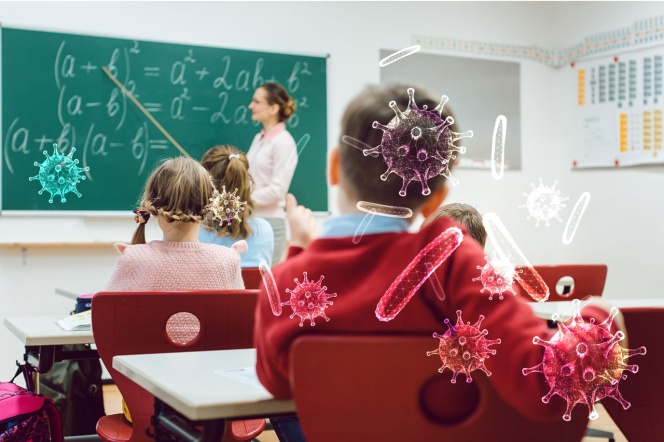Date added: 2022-11-03
How to detect a virus in immediate surroundings? An early warning system is developed at Gdańsk Tech

Wastewater analysis allows for a real-time monitoring of the social well-being. It is based on the assumption that substances and microorganisms excreted by the human organism can be identified and analyzed, and their quality and volume changes can be extremely useful when detecting i.a. social or infectious diseases. When it comes to epidemiological research, the wastewater-based analysis is particularly important as the clinical diagnosis resources are usually limited (e.g. due to impossibility or unwillingness to do ordinary tests), and the reporting systems can be ineffective (e.g. due to asymptomatic or non-specific course of a disease).
Research team managed by Prof. Małgorzata Szczerska from the Faculty of Electronics, Telecommunications and Informatics, studies the application of a biosensor - an ultrafast diagnostic tool that uses telecommunications fibers, for detection of viruses or their components.
– When traditionally testing wastewater for viruses, a qualified personnel and complex laboratory equipment are required. The samples are collected and transported to a specialist laboratory and there tested and evaluated by specialists. It is a necessary, however expensive and time-consuming solution – explains Prof. Małgorzata Szczerska.
– Thanks to the application of biosensors in fiber optic networks, we are able to monitor wastewater continuously, in real time. Our solution is incomparably cheaper and more ecological, it does not require any additional reagents, or excessive use of energy and specialists. Hence, it is consistent with the green technologies strategy – emphasizes Paweł Wityk, PhD Eng, from the Faculty of Chemistry.
The system instantly alarms
The core idea and aim of the project is to build an easy and economic early warning system.
– If we observe coronavirus or flu virus particles, or related antibodies, or the increasingly spreading measles in the plumbing system of a school, kindergarten, nursing home, hospice or other unit, we can undertake preventive measures and nip it in the bud. Consequently, we work effectively and on a local level. It is unnecessary to isolate more people, close entire districts or cities.
Moreover, the person or a team that supervises safety of a given institution, does not have to know how to analyze data collected by the biosensors. A special application, installed on a computer or a mobile device, will alarm the user.
– The solution is in advanced discussions with the interested educational institutions and nursing homes – emphasizes the researcher.
Educational value
The project includes workshops and information meetings with representatives of target groups (e.g. educational institutions) and participation in international scientific conferences aimed at increasing public awareness in the area of achieving the goals of sustainable development. The extent to which introduction and availability of the developed sensors affects the sense of security during a pandemic will be investigated during the meetings. The aspect of increasing work efficiency and reducing stigmatization of people who are mistakenly perceived as infected due to chronic respiratory diseases or allergies will also be analyzed.

The interdisciplinary project team consists of representatives of 5 faculties of Gdańsk Tech: from the Faculty of Electronics, Telecommunications and Informatics: Małgorzata Szczerska, DSc, Gdańsk Tech Prof. – the project manager, Paulina Listewnik, PhD Eng; from the Faculty of Civil and Environmental Engineering: Sylwia Fudala-Książek, DSc, Gdańsk Tech Prof, Aneta Łuczkiewicz, DSc, Gdańśk Tech Prof.; from the Faculty of Applied Physics and Mathematics: Prof,. Grzegorz Graff, DSc, Paweł Pilarczyk, DSc, Gdańśk Tech Prof.; from the Faculty of Chemistry: Paweł Wityk, PhD and from the Faculty of Management and Economics: Małgorzata Gawrycka, DSc, Gdańsk Tech Prof. and Michał Tomczak, PhD.

